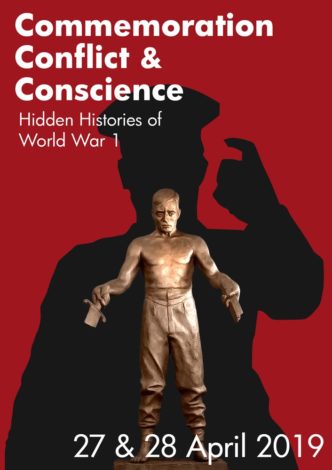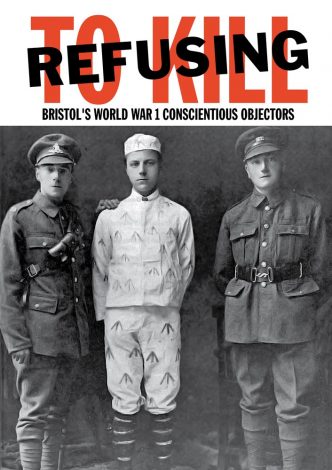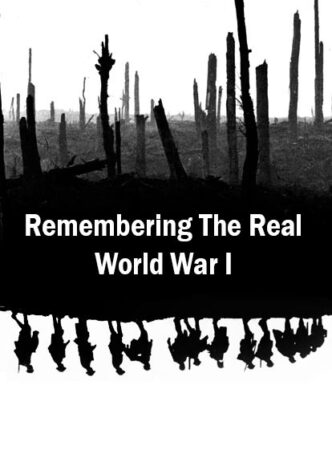This book launch will include talks by some of the authors and time for questions and answers. Both booklets will be available to buy at the festival. Refusing to Kill: Bristol's World War I Conscientious Objectors by Remembering the Real World War 1 Lois Bibbings, Jeremy Clarke, Mary Dobbing, Colin Thomas This A4 colour booklet reflects the work of a community history project undertaken by Remembering the Real World War 1, with support from researchers around the country as well as descendants […]
 Not A BRHG Event
Not A BRHG Event
Being a CO in Burton-on-Trent Karen Hunt speaks about the Mid Staffordshire Appeals Tribunal and what the records reveal about life on the Staffordshire home front. Amongst the Appeals papers were a group of men from Burton-on-Trent who refused to take part in the Great War either as combatants or non-combatants. Their unequivocal stand as COs led to court martials and imprisonment. Karen explores the particular local home front from which this small group of brave men emerged and the political, […]
 Not A BRHG Event
Not A BRHG Event
Alison Ronan presents two films she has worked on and will be at the screenings to speak about them and answer questions. These Dangerous Women Documentary about the women who tried to stop World War 1. In 1915 1300 women from warring and neutral nations got together in the Hague to find a way towards peace. (24 minutes) Women's Peace Crusade The Women's Peace Crusade swept like wildfire across Britain from 1916 -1918. This film tells the story of the North West women who took part in […]
 Not A BRHG Event
Not A BRHG Event
Tony T presents his documentary 'Mutiny' which looks at the British Caribbean experience of the First World War and its legacies, as revealed by the last surviving veterans of the British West Indies Regiment. The film is formed of archival materials, drama reconstructions and eye-witness and expert interviews shot in Jamaica, Cuba, Guyana, Barbados, St. Lucia, Italy and the UK. (50 minutes). Tony T of Sweet Patootee (who conceived, researched, wrote and produced the film) and Julian Putkowski […]
 Not A BRHG Event
Not A BRHG Event
Making It Home Mark Rhead presents his film 'Making it Home' (67 minutes) and a photographic exhibition made in partnership with the Bellanaleck Local History Group. Making it Home is the story of eleven ex-servicemen who returned from the Great War to live and farm on Cleenish Island in Upper Lough Erne, County Fermanagh, Northern Ireland. A small exhibition of photographs of these ‘homes for heroes’ accompanies this screening. Mark Rhead will be at the screening to speak about the film, his […]
 Not A BRHG Event
Not A BRHG Event
As part of the Lunchtime Lecture series organised by Bristol Libraries visual artist Jude Hutchen will present the ideas behind her current exhibition at the Central Library: ‘A Colour Chart for Killing – the legacy of World War One ‘the war to end all wars’, part of the ‘Commemoration, Conflict and Conscience’ festival program. Imagery from the housing market and home decorating is plundered to provoke questions about personal responsibility for mass violence, through connecting our quality of […]
 Not A BRHG Event
Not A BRHG Event
'England's difficulty is Ireland's opportunity' Joe Mooney of East Wall History Group, Dublin explains how Irish Nationalists responded to the Great War. His talk will outline the difficulties of the 'Irish question', the movement towards Home Rule and the rise of armed bodies in 1913/1914. How did these conflicting groups react to the outbreak of war and the possibility of conscription - and why did some Nationalist support the war effort while others opposed it? Some saw the Irish rebellion of […]
Over 580 men from the Bristol area refused to fight in World War 1. They claimed the status of conscientious objector (CO) for moral, religious or political reasons. Some agreed to take non-military roles while others spent much of the war in prison, often under harsh conditions. This booklet and the exhibition on which it is based tell the story of these COs and the men and women who supported them. It also briefly considers COs in World War 2 as well as the position for present day members of […]
Otherstory puppetry will be leading a history walk with a difference on April 7th in Bedminster. The walk will use the medium of puppetry to tell the untold stories of Bedminster people who resisted the First World War, and who refused to kill. Otherstory have devised and organised the walk with local people and in collaboration with Remembering the Real World War 1 history group. The walk will start at the Tobacco Factory Cafe Bar and wind its way through Southville, along North Street and part […]
Anyone who saw Michael Mears’ one-man show ‘This Evil Thing’ in Bristol Cathedral in October 2017 will know what a powerful piece of theatre it is. We are now pleased to present two new performances, linked to the Commemoration, Conflict & Conscience festival at the end of April. The two performances (3.30pm and 7.30pm) take place on Sunday April 21st – Easter Sunday in the atmospheric surroundings of the crypt of St John the Baptist Church, one of Bristol’s oldest medieval buildings. […]



